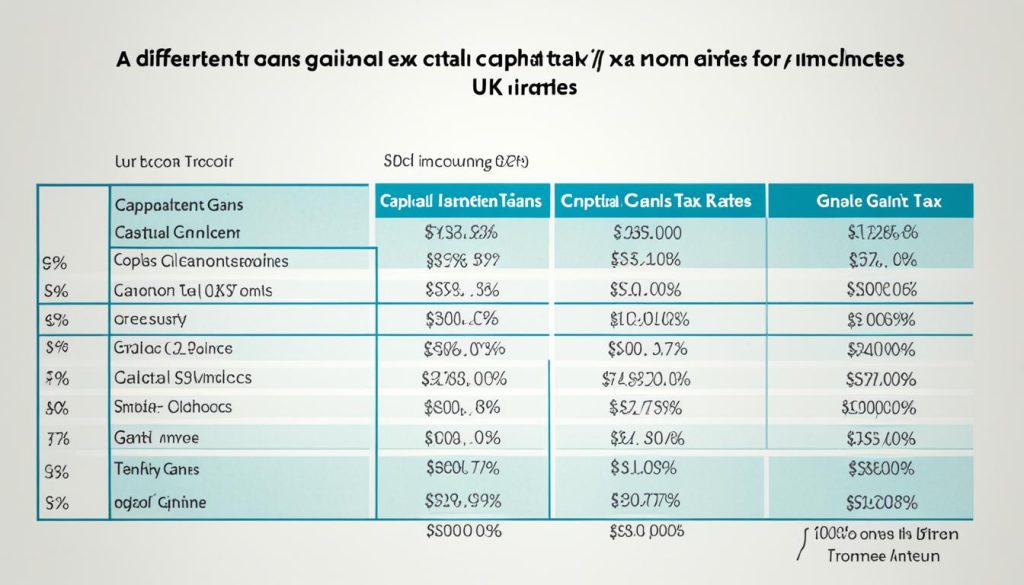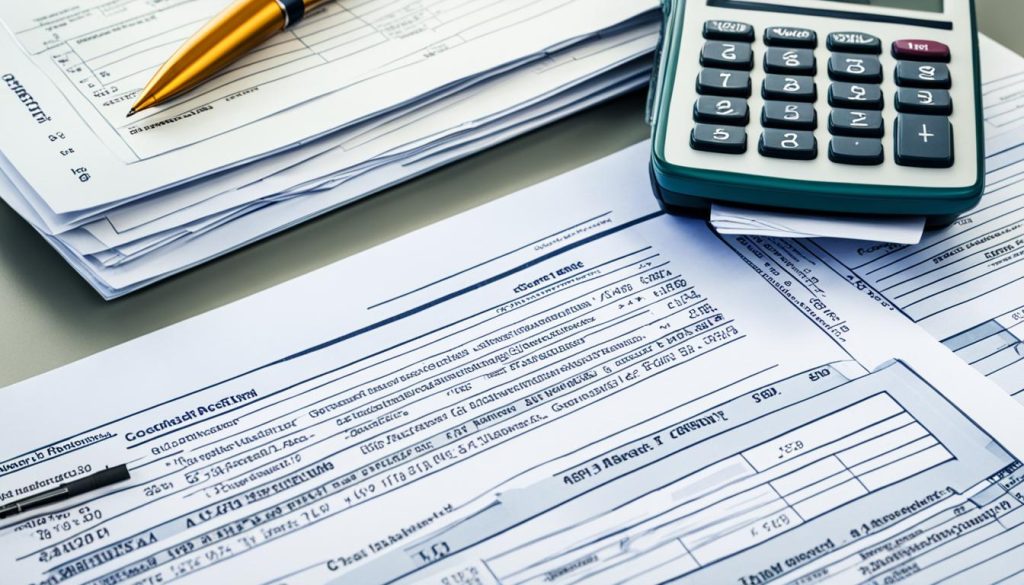Are you wondering about the capital gains tax in the UK? Understanding the rates, allowances, and how to calculate your tax liability is essential. Let’s delve into the details to help answer your questions.
Capital gains tax in the UK is calculated based on the type of asset being sold and your taxable income. The rates and allowances vary depending on these factors. Whether you’re selling residential property or other chargeable assets, it’s crucial to consider the applicable tax rates.
To determine your tax liability, take into account the capital gains tax allowance. This amount allows you to earn tax-free gains up to a certain limit. It’s also helpful to use tools like the capital gains tax calculator to estimate your tax amount.
So, how much is capital gains tax in the UK? Stay with us as we explore the rates, allowances, and reporting procedures to help you navigate the complexities of capital gains tax and ensure compliance with UK tax regulations.
How Much is Capital Gains Tax in the UK?
When it comes to capital gains tax in the UK, the rates are determined by two main factors: the individual’s taxable income and the type of asset being sold. Let’s take a closer look at the current capital gains tax rates and how they are applied.
For higher or additional rate taxpayers, the capital gains tax rate for gains from residential property is 28%, while gains from other chargeable assets are taxed at a rate of 20%. On the other hand, basic rate taxpayers have a more nuanced calculation based on the size of the gain, taxable income, and the nature of the asset.
The table below provides a summary of the capital gains tax rates in the UK:
| Income Level | Residential Property | Other Chargeable Assets |
|---|---|---|
| Higher/Additional Rate Taxpayer | 28% | 20% |
| Basic Rate Taxpayer | 10% to 28% (based on gain, taxable income, and asset type) | 10% to 20% (based on gain, taxable income, and asset type) |
It is important to note that the rates can vary between 10% and 28% for basic rate taxpayers, depending on the size of the gain, taxable income, and whether it is from residential property or other assets.
Understanding the applicable capital gains tax rate is crucial for individuals planning to sell assets and ensure compliance with UK tax regulations. Now, let’s proceed to Section 3 to explore capital gains tax allowances and exemptions.

Capital Gains Tax Allowances and Exemptions
When it comes to capital gains tax in the UK, there are various allowances and exemptions that individuals should be aware of. These can help minimize or even eliminate the tax liability on certain gains. Understanding the rules and thresholds surrounding capital gains tax is essential to fully take advantage of these benefits.
One of the key aspects of capital gains tax allowances is the annual exempt amount. This determines the tax-free threshold for an individual’s gains. The annual exempt amount may vary depending on the individual’s circumstances, such as whether they are a regular taxpayer or acting as a trustee for disabled people.
For the 2023/2024 tax year, most individuals and personal representatives have an annual exempt amount of £6,000. However, other trustees have a lower amount of £3,000. It’s important to note that these figures can change from year to year, so staying updated with the latest thresholds is crucial.
Additionally, specific rules may apply for certain individuals, such as those acting as trustees for disabled people. These individuals may have different rates and thresholds for capital gains tax exemptions. Understanding these distinctions can help individuals in similar situations make the most of their allowances.
To ensure a clear understanding of the applicable rules and thresholds, it’s advisable to consult with a tax professional or refer to authoritative sources such as HM Revenue and Customs (HMRC). By taking advantage of the available capital gains tax exemptions and allowances, individuals can minimize their tax liability and make the most of their investment gains.

Summary
Capital gains tax allowances and exemptions play a crucial role in determining the tax liability on investment gains in the UK. By understanding the specific rules and thresholds, individuals can make informed decisions to minimize their tax burden. Keeping up-to-date with the latest figures and consulting with tax professionals will ensure individuals take full advantage of the available exemptions and allowances, optimizing their tax planning strategies.
Reporting and Paying Capital Gains Tax
Reporting and paying capital gains tax in the UK is an essential part of fulfilling your tax obligations. To ensure compliance with UK tax regulations, individuals must accurately document their gains, deduct any applicable allowances, and report the taxable amount to HMRC. Maintaining meticulous records and documentation of all transactions and relevant information is crucial for accurate reporting and can be highly beneficial in case of any questions or disputes regarding tax liability.
When it comes to reporting and paying capital gains tax, record keeping plays a vital role. By keeping comprehensive records of your financial activities and transactions, you can easily track the acquisition and disposal of assets, calculate the gains accurately, and validate your tax calculations. These records should include relevant documents such as purchase and sale agreements, valuations, and receipts.
Accurate record keeping allows you to confidently report your capital gains to HMRC and provides a solid foundation for any future inquiries or audits. It also helps you keep track of your tax liabilities, ensuring that you meet all reporting deadlines and avoid potential penalties for late or incorrect submissions.
In addition to maintaining records, it is essential to understand the process of reporting and paying capital gains tax. Familiarize yourself with the specific forms and guidelines provided by HMRC, such as the Self-Assessment Tax Return, which is commonly used for reporting capital gains. Ensure that you have a clear understanding of the tax rates, allowances, exemptions, and deadlines associated with capital gains tax.
Taking advantage of technology can also simplify the reporting and payment process. HMRC provides online tools and resources that can assist you in accurately calculating your capital gains tax liability. These tools, such as the Capital Gains Tax Calculator, can help you estimate your tax liability and ensure that you report the correct amount.
“Reporting and paying capital gains tax is crucial for ensuring compliance with UK tax regulations. Accurate record keeping and a clear understanding of the reporting process are essential for meeting your tax obligations.”
Capital Gains Tax Record Keeping Tips:
- Maintain a dedicated folder or digital file for all relevant documents related to capital gains.
- Organize your records chronologically and by asset type, making it easier to locate information when needed.
- Keep copies of all receipts, valuations, purchase and sale agreements, and any other supporting documentation.
- Regularly update and review your records to ensure accuracy and completeness.
- Consider consulting with a tax professional or accountant to ensure your records are in order and that you are maximizing any tax advantages.
By understanding and following the process of reporting and paying capital gains tax, along with diligent record keeping, individuals can fulfill their tax obligations and avoid potential penalties or disputes. Stay informed, keep accurate records, and consult with professionals when necessary to navigate the complexities of capital gains tax in the UK.

Conclusion
Understanding and navigating capital gains tax in the UK is crucial to ensure compliance with tax regulations and minimize your tax liability. The amount of capital gains tax you owe is determined by several factors, including the type of asset you sell and your taxable income.
Calculating your capital gains tax can be complex, but practical tools such as the capital gains tax calculator can help you estimate your tax liability more accurately. By inputting the necessary information, such as the asset type and sale proceeds, you can get an estimate of how much capital gains tax you may owe.
Staying informed about the current rates and rules surrounding capital gains tax in the UK is also essential. Tax rates vary depending on your taxable income and the nature of the asset being sold. By keeping up to date with any changes and exemptions, you can make informed decisions about your investments and tax planning strategies.
Remember to maintain accurate records and documentation of your transactions, as this will greatly assist you when reporting and paying your capital gains tax. By understanding the intricacies of capital gains tax and utilizing available resources, you can navigate the process more effectively and optimize your tax planning strategies.
FAQ
What are the current capital gains tax rates in the UK?
The current capital gains tax rates in the UK are 28% for gains from residential property and 20% for gains from other chargeable assets for higher or additional rate taxpayers. Basic rate taxpayers have rates ranging from 10% to 28%, depending on the size of the gain, taxable income, and asset type.
What are the capital gains tax allowances and exemptions in the UK?
The UK has various allowances and exemptions for capital gains tax. The annual exempt amount determines the tax-free threshold, which is £6,000 for most individuals and personal representatives for the 2023/2024 tax year. Trustees have a lower annual exempt amount of £3,000, with certain exceptions for trustees of disabled individuals. It is important to understand the specific rules and thresholds to take advantage of any allowances or exemptions that may apply.
How can I report and pay capital gains tax in the UK?
Individuals are responsible for calculating their gains, deducting any applicable allowances, and reporting the taxable amount to HMRC. Accurate record-keeping and maintaining documentation of transactions and relevant information is essential for accurate reporting. It is important to stay informed about the current rules and regulations regarding reporting and paying capital gains tax in the UK.




